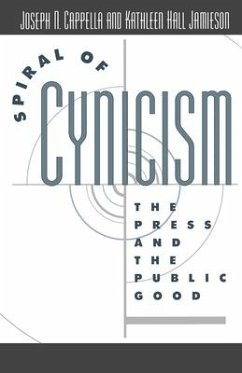This work provides evidence that the way the American news and broadcast media currently cover political issues and events directly causes increased voter cynicism and non-participation. It examines how the media covers both political campaigns and significant legislation (such as the passage of health care reform). The focus on the game of politics, rather than its substance, fuels a cycle of cynicism, trapping media, politicians and voters. Giving reason to hope, the authors provide detailed discussion of what the media could do to halt the current cycle of cynicism.
The cynic tends to hold that the political system is corrupt; its players are Machiavellian partisans uninterested in the public good, its process driven by a concern with winning, not governing. Because we cannot know what motivates an individual and because any action can be recast to serve some selfish end, the cynic's position is ultimately not contestable. If an inherent conflict exists between the self-interest of a political leader and the public good, then press reports of self-interested political action are not cynical but realistic.
Hinweis: Dieser Artikel kann nur an eine deutsche Lieferadresse ausgeliefert werden.
The cynic tends to hold that the political system is corrupt; its players are Machiavellian partisans uninterested in the public good, its process driven by a concern with winning, not governing. Because we cannot know what motivates an individual and because any action can be recast to serve some selfish end, the cynic's position is ultimately not contestable. If an inherent conflict exists between the self-interest of a political leader and the public good, then press reports of self-interested political action are not cynical but realistic.
Hinweis: Dieser Artikel kann nur an eine deutsche Lieferadresse ausgeliefert werden.








